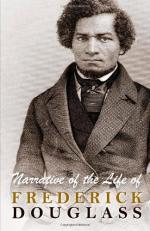|
|
The Narrative of the Life of Frederick Douglass Chapter 5
As a young child, Douglass spends most of his time at Colonel Lloyd's plantation running errands for Mrs. Lucretia Auld. Most of his leisure time is spent in the company of Master Daniel Lloyd, who treats young Douglass well. However, Douglass experiences the pains of hunger and cold on a daily basis. On cold nights, Douglass sleeps in a stolen bag so that he does not freeze to death. Slave children are fed mush, or boiled corn meal, on a trough like pigs. The strongest and the fastest eats best, though none are ever satisfied.
Topic Tracking: Dehumanization 4
When he is seven or eight years old, Douglass is sent to Baltimore to live with Mr. Hugh Auld, the brother of Captain Thomas Auld. Douglass is overjoyed upon hearing the news. The three days leading up to his move to Baltimore is considered the happiest days of his life. He spends most of that time at the creek, "washing off the plantation scurf." Douglass takes to heart the task of cleaning himself because of Mrs. Lucretia's promise to provide him with a pair of trousers. Of leaving Colonel Lloyd's plantation he feels no sorrow or loss because his mother is dead, he seldom sees his grandmother, and his relationships with his two sisters and one brother are quite limited. He places great hope in going to Baltimore, having heard from Cousin Tom about its splendid, majestic beauty. Douglass arrives in Baltimore early Sunday morning and is greeted by Mr. and Mrs. Auld, along with their little son, Thomas. And on the beaming, kindly face of Mrs. Sophia Auld, Douglass encounters something never seen before on the face of a white master-kindness. Douglass points to his move to Baltimore as the first major step toward freedom. He attributes his selection among so many other children to go to Baltimore as an act of divine Providence.
"From my earliest recollection, I date the entertainment of a deep conviction that slavery would not always be able to hold me within its foul embrace; and in the darkest hours of my career in slavery, this living word of faith and spirit of hope departed not from me, but remained like ministering angels to cheer me through the gloom. This good spirit was from God, and to him I offer thanksgiving and praise." Chapter 5, pg. 75




